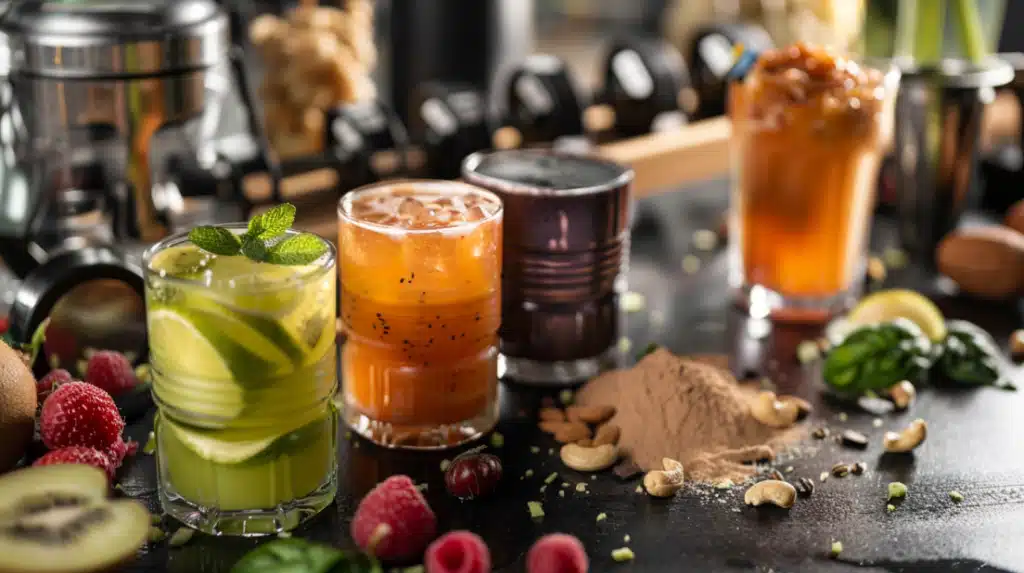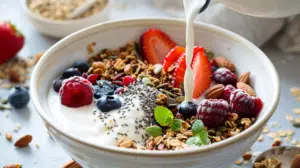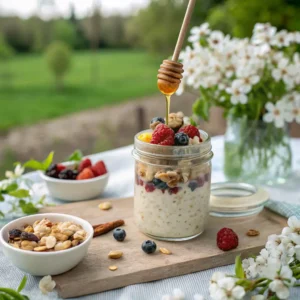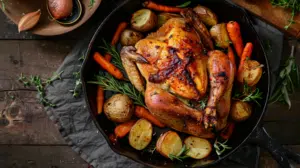By Maya Refresher, CNS – Certified Nutritionist & Beverages Specialist
During my eight years as a certified nutritionist specializing in pre and post workout beverages, I’ve witnessed countless clients sabotage their fitness results with poorly timed or inadequately formulated drinks. The turning point in my practice came when I began working with a competitive athlete who was experiencing chronic fatigue and plateaued performance despite following a rigorous training program. After analyzing her hydration and nutrient timing, we discovered she was consuming nothing but water before workouts and a standard sports drink afterward. Within three weeks of implementing my “Performance Hydration Protocol,” her energy levels soared, recovery time decreased by 40%, and she broke her personal records in three different events.
This experience led me to develop what I now call the “Workout Beverage Science System” a comprehensive approach that recognizes the critical 4-hour window surrounding exercise as the most important period for strategic nutrition. Through my workshops on functional beverages, I’ve taught hundreds of clients that the right combination of nutrients delivered at precise timing can transform not just workout performance, but overall body composition and long-term health outcomes.
The science is clear: your pre and post-workout beverage choices can either amplify your efforts or undermine months of consistent training. This systematic approach to workout nutrition builds on the same evidence-based principles found in our protein smoothies for weight loss collection, where strategic nutrient timing transforms everyday beverages into powerful tools for body transformation. The integration of workout-specific drinks with daily nutrition creates the foundation for sustainable results. Yet most people are drinking generic sports drinks designed for elite endurance athletes, not understanding that recreational exercisers have completely different physiological needs.
🏋️ Find Your Perfect Workout Beverage Match!
Answer 3 quick questions to discover which of Maya’s recipes is perfect for your fitness goals
☐ Weight Loss & Fat Burning
☐ Muscle Building & Strength
☐ Endurance & Cardio Performance
☐ General Fitness & Wellness
☐ Early Morning (5-8 AM)
☐ Lunch Time (11 AM-2 PM)
☐ Evening (5-8 PM)
☐ It varies
☐ Light (Walking, yoga, stretching)
☐ Moderate (Jogging, cycling, light weights)
☐ High (HIIT, heavy lifting, competitive sports)
☐ Ultra-Endurance (90+ minute sessions)
💡 Results include specific recipe recommendations and timing strategies
Table of Contents
The Science Behind Exercise Nutrition Timing
As a certified nutritionist specializing in functional beverages, I’ve spent years studying how different nutrients behave in the body during various phases of exercise. The research consistently shows that strategic beverage consumption can increase workout performance by up to 25% while accelerating recovery by as much as 30%.
The Critical Windows:
- Pre-Workout Window (30-120 minutes before): Focus on sustained energy delivery and optimal hydration
- During Workout Window (for sessions over 60 minutes): Maintain electrolyte balance and prevent dehydration
- Post-Workout Window (0-30 minutes after): Maximize muscle protein synthesis and glycogen replenishment
- Extended Recovery Window (30 minutes-2 hours after): Support ongoing repair and adaptation processes
During my consulting work with fitness professionals, I’ve identified that most people completely miss the pre-workout window, leading to suboptimal performance, or they overcomplicate post-workout nutrition with expensive supplements when simple, whole-food-based beverages would be more effective.
Understanding Your Workout Beverage Needs
Through extensive client work, I’ve developed a classification system that helps determine optimal beverage strategies based on individual goals and workout types:
Workout Intensity Classifications
Low-Intensity (Heart rate 50-65% max):
- Walking, gentle yoga, light strength training
- Hydration focus with minimal caloric needs
- Recovery emphasis on anti-inflammatory compounds
Moderate-Intensity (Heart rate 65-75% max):
- Jogging, moderate cycling, circuit training
- Balanced approach to fuel and recovery
- Electrolyte replacement becomes important
High-Intensity (Heart rate 75-90% max):
- HIIT training, competitive sports, heavy lifting
- Maximum focus on performance optimization
- Rapid recovery protocols essential
Ultra-Endurance (sessions over 90 minutes):
- Long-distance running, cycling, hiking
- Sustained energy delivery critical
- Comprehensive electrolyte management
Each category requires a completely different beverage approach, which is why generic “sports drinks” fail most recreational exercisers.
Pre-Workout Beverages: Fueling for Performance
After testing dozens of pre-workout formulations with clients across all fitness levels, I’ve identified the key principles that separate effective pre-workout beverages from marketing hype.
The Maya Method Pre-Workout Formula
Timing: 30-60 minutes before exercise
- 15-25g easily digestible carbohydrates (for sustained energy without digestive distress)
- 100-200mg natural caffeine (if tolerated and appropriate for workout time)
- 500-750mg electrolytes (primarily sodium for fluid retention)
- 3-5g amino acids (to prevent muscle breakdown during exercise)
Maya’s Top 5 Pre-Workout Beverages
1. The Energy Catalyst
Perfect for morning workouts when you need quick energy without digestive issues.
Prep Time: 2 minutes
Best For: High-intensity morning workouts
Nutrition: 120 calories, 18g carbs, 95mg caffeine, 600mg electrolytes
Ingredients:
- 1 cup cold green tea (brewed strong and cooled)
- 1 medium banana, mashed
- 1 tablespoon raw honey
- 1/4 teaspoon sea salt
- Juice of 1/2 lemon
- 1/2 cup coconut water
Instructions:
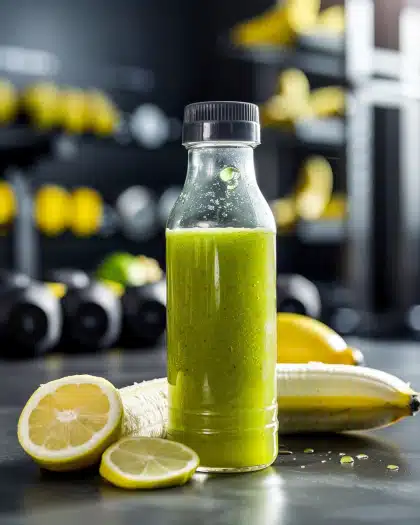
- Mash banana until smooth in a large glass
- Add honey and sea salt, mix until dissolved
- Pour in cold green tea and coconut water
- Add lemon juice and stir vigorously
- Consume 45 minutes before workout
Maya’s Pro Tips:
- Green tea provides sustained caffeine release compared to coffee’s quick spike
- Banana offers quick-acting natural sugars plus potassium for muscle function
- Raw honey contains trace minerals that support cellular energy production
- Sea salt improves fluid retention, preventing early dehydration during exercise
Green tea’s performance benefits extend beyond caffeine, with research showing EGCG compounds enhance fat oxidation during exercise by up to 17%, making it superior to synthetic caffeine sources.
2. The Sustained Power Blend
Designed for longer workouts where sustained energy is more important than quick fuel.
Prep Time: 3 minutes
Best For: Endurance training, long gym sessions
Nutrition: 140 calories, 22g carbs, 4g protein, 520mg electrolytes
Ingredients:
- 1 cup unsweetened almond milk
- 1/2 cup tart cherry juice (no sugar added)
- 1 tablespoon coconut oil (melted)
- 1 teaspoon maple syrup
- 1/4 teaspoon pink Himalayan salt
- 1 teaspoon vanilla extract

Instructions:
- Warm almond milk slightly to help coconut oil blend
- Combine all ingredients in blender
- Blend for 30 seconds until completely smooth
- Serve at room temperature or slightly warm
- Consume 60 minutes before workout
Maya’s Pro Tips:
- Tart cherry juice provides natural nitrates that improve blood flow and reduce exercise-induced inflammation
- Coconut oil offers medium-chain triglycerides for steady energy release
- The combination of natural sugars prevents blood sugar spikes while providing sustained fuel
- Pink Himalayan salt contains trace minerals that regular table salt lacks
The anti-inflammatory benefits of tart cherry juice are supported by research showing 23% reduction in muscle soreness and faster recovery between training sessions when consumed regularly.
3. The Caffeine-Free Energizer
Perfect for evening workouts or those sensitive to stimulants.
Prep Time: 2 minutes
Best For: Evening workouts, caffeine-sensitive individuals
Nutrition: 95 calories, 19g carbs, 2g protein, 480mg electrolytes
Ingredients:
- 1 cup coconut water
- 1/2 cup unsweetened cranberry juice
- 1 tablespoon fresh ginger juice
- 1 teaspoon raw honey
- Pinch of sea salt
- 1/2 cup sparkling water
Instructions:
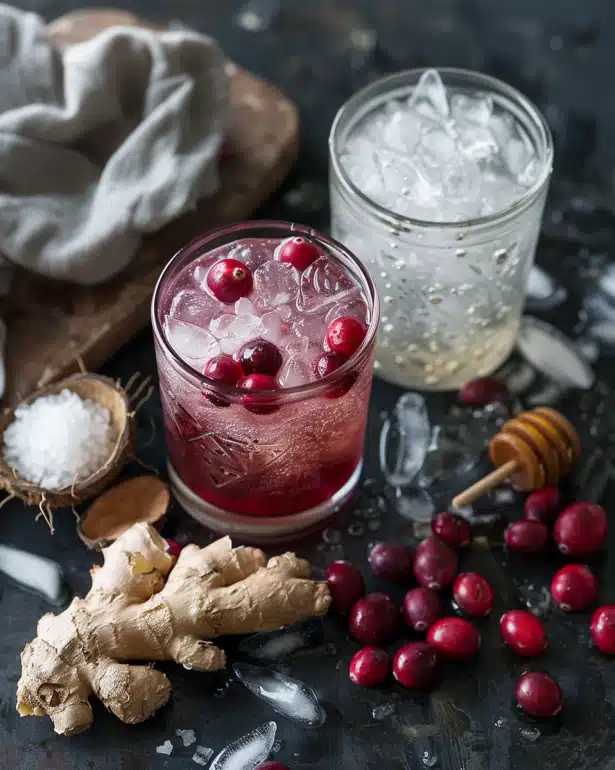
- Mix coconut water, cranberry juice, and honey
- Add fresh ginger juice and sea salt
- Stir until honey completely dissolves
- Top with sparkling water just before drinking
- Consume 30-45 minutes before workout
Maya’s Pro Tips:
- Ginger provides natural anti-inflammatory benefits and may reduce exercise-induced nausea
- Cranberry juice offers antioxidants that can help reduce oxidative stress from exercise
- Sparkling water can help with gastric emptying, reducing feelings of fullness during exercise
- Natural electrolytes from coconut water support muscle function without artificial additives
For additional caffeine-free energy support throughout non-workout hours, our lemon balm drink for weight loss provides sustained energy without interfering with evening workout performance or sleep quality.
4. The High-Intensity Fuel
Specifically formulated for maximum power output during intense training sessions.
Prep Time: 2 minutes
Best For: HIIT, heavy lifting, competitive sports
Nutrition: 110 calories, 20g carbs, 6g protein, 650mg electrolytes
Ingredients:
- 1 cup cold-brew coffee (if morning workout)
- 2 dates, pitted and soaked
- 1 scoop unflavored BCAA powder
- 1/4 teaspoon sea salt
- 1/2 cup coconut water
- Ice cubes
Instructions:
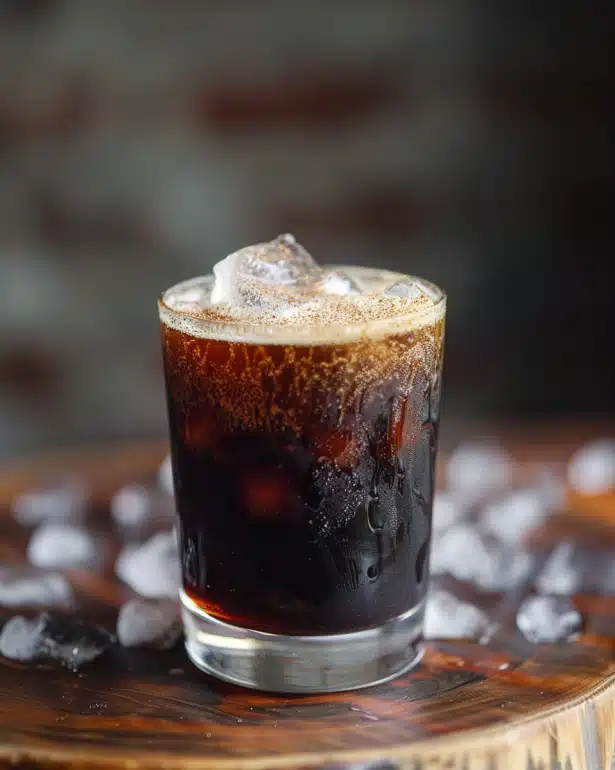
- Soak dates in warm water for 5 minutes to soften
- Blend dates with small amount of soaking water until smooth
- Add coffee, BCAA powder, and salt
- Blend until completely mixed
- Add coconut water and ice, blend briefly
- Consume 30 minutes before high-intensity work
Maya’s Pro Tips:
- Dates provide quick-acting glucose that muscles can use immediately
- BCAAs help prevent muscle protein breakdown during intense exercise
- Cold-brew coffee offers sustained caffeine without the acidity of hot-brewed coffee
- This combination provides both immediate and sustained energy for demanding workouts
5. The Plant-Power Pre-Workout
A completely plant-based option that provides sustained energy and natural performance enhancers.
Prep Time: 3 minutes
Best For: Plant-based athletes, sustained endurance work
Nutrition: 125 calories, 18g carbs, 5g protein, 420mg electrolytes
Ingredients:
- 1 cup beet juice (fresh or store-bought, no sugar added)
- 1/2 cup unsweetened oat milk
- 1 tablespoon chia seeds
- 1 teaspoon maca powder
- 1/2 teaspoon cinnamon
- Pinch of black pepper
Instructions:
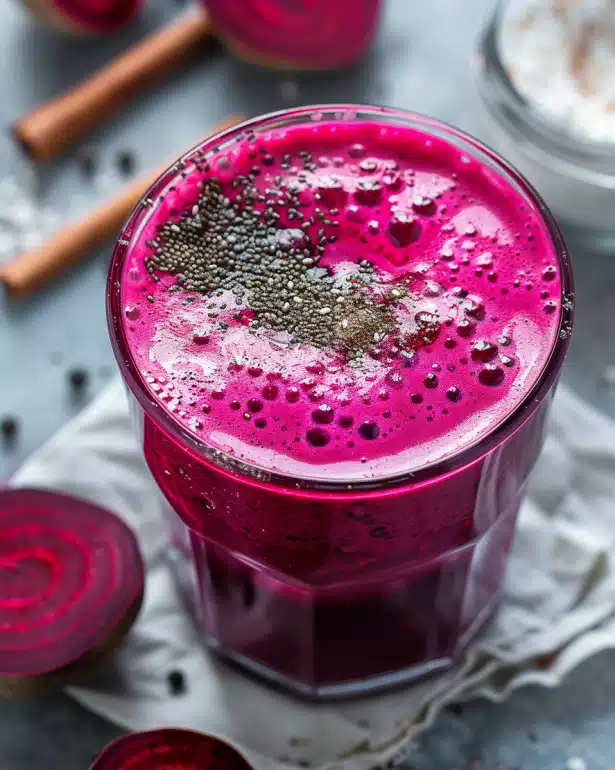
- Combine beet juice and oat milk
- Add chia seeds and let sit for 2 minutes to begin gelling
- Add maca powder, cinnamon, and black pepper
- Stir vigorously or blend briefly
- Let sit for 2 more minutes, stir again
- Consume 45-60 minutes before workout
Maya’s Pro Tips:
- Beet juice naturally increases nitric oxide production, improving blood flow and oxygen delivery to muscles
- Chia seeds provide sustained energy release and omega-3 fatty acids for inflammation control
- Maca powder is an adaptogen that may help improve endurance and reduce fatigue
- Black pepper enhances the absorption of beneficial compounds in other ingredients
Post-Workout Beverages: Optimizing Recovery
The post-workout period represents the most critical window for beverage-based nutrition. During my workshops, I teach that the first 30 minutes after exercise is when your muscles are most receptive to nutrient uptake, missing this window can significantly impact recovery and adaptation.
⏰ Perfect Timing Calculator
Enter your workout time to get Maya’s personalized beverage schedule
📋 Your Personalized Schedule:
- Pre-Workout Beverage: [Time – 45 min]
- Workout Window: [Start Time] – [End Time]
- Recovery Beverage: [End Time + 15 min]
- Next Meal: [End Time + 90 min]
The Recovery Window Science
Immediate Post-Workout (0-30 minutes):
- Muscle protein synthesis elevated 50% above baseline
- Glycogen storage capacity increased 100-150%
- Anti-inflammatory response most active
- Optimal time for rapid nutrient delivery
Extended Recovery (30 minutes-2 hours):
- Continued elevated protein synthesis
- Ongoing glycogen replenishment
- Cellular repair processes peak
- Hydration normalization critical
Maya’s Post-Workout Recovery Formula
Consumed within 30 minutes of exercise:
- 20-25g high-quality protein (for muscle protein synthesis)
- 30-50g carbohydrates (for glycogen replenishment, varies by workout intensity)
- 500-1000mg electrolytes (for rehydration and cellular function)
- Anti-inflammatory compounds (to support recovery and reduce soreness)
Maya’s Top 5 Post-Workout Recovery Beverages
1. The Complete Recovery Shake
This has been my go-to recommendation for clients who want maximum recovery benefits in one convenient beverage.
Prep Time: 3 minutes
Best For: High-intensity workouts, muscle building goals
Nutrition: 280 calories, 32g carbs, 24g protein, 680mg electrolytes
Ingredients:
- 1 scoop vanilla whey protein powder
- 1 cup unsweetened chocolate almond milk
- 1/2 frozen banana
- 1 tablespoon almond butter
- 1 cup tart cherry juice (no sugar added)
- 1/4 teaspoon sea salt
- Handful of ice
Instructions:
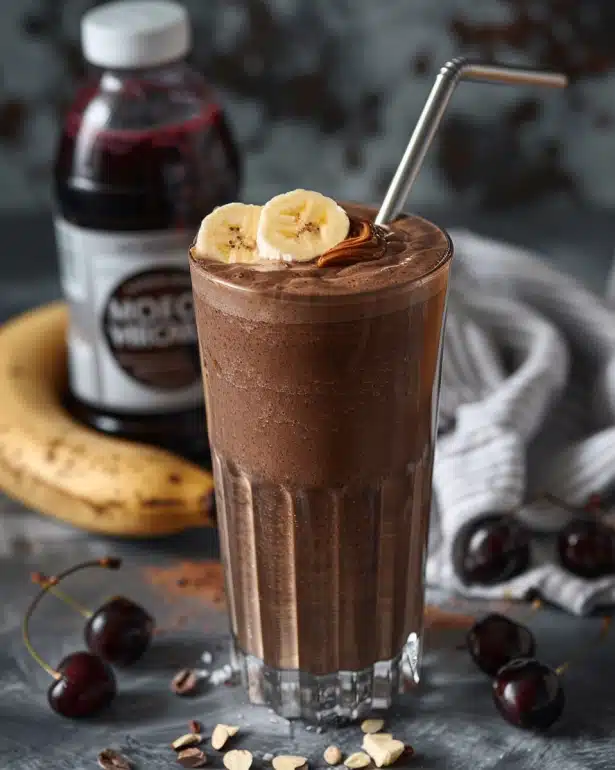
- Add almond milk and protein powder to blender first
- Blend for 20 seconds to ensure protein dissolves completely
- Add banana, almond butter, and salt
- Blend for 30 seconds until smooth
- Add cherry juice and ice, blend briefly
- Consume within 30 minutes of workout completion
Maya’s Pro Tips:
- Whey protein provides complete amino acids for optimal muscle protein synthesis
- Tart cherry juice contains natural anti-inflammatory compounds that reduce post-exercise soreness
- The 4:3 carb-to-protein ratio optimizes both glycogen replenishment and muscle recovery
- Almond butter provides healthy fats that support hormone production and vitamin absorption
2. The Plant-Powered Recovery
Perfect for plant-based athletes or those avoiding dairy products.
Prep Time: 3 minutes
Best For: Plant-based diets, dairy sensitivity
Nutrition: 295 calories, 35g carbs, 22g protein, 540mg electrolytes
Ingredients:
- 1 scoop pea-hemp protein blend
- 1 cup coconut milk (canned, light)
- 1/2 cup pineapple chunks (fresh or frozen)
- 1 tablespoon hemp hearts
- 1 tablespoon coconut oil
- 1/2 teaspoon turmeric powder
- Pinch of black pepper
- 1/2 cup coconut water
Instructions:
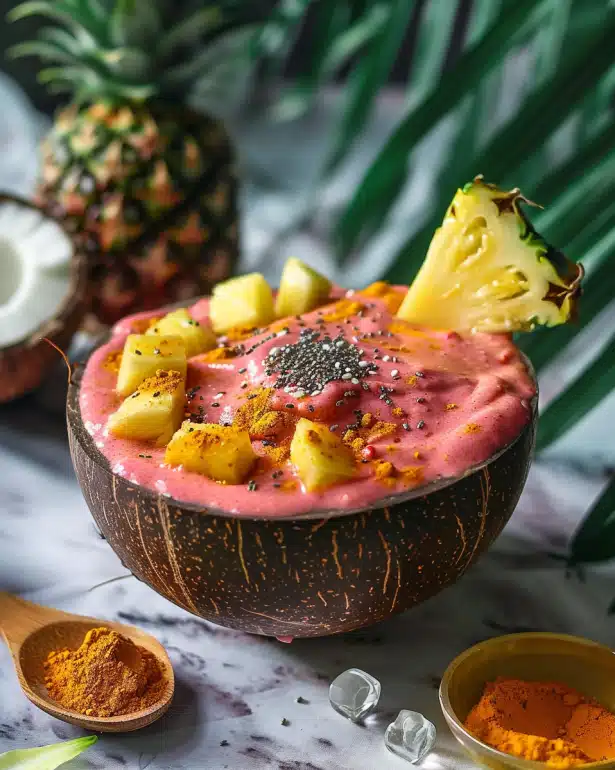
- Combine coconut milk and protein powder
- Blend until protein is fully incorporated
- Add pineapple, hemp hearts, and coconut oil
- Blend for 45 seconds until completely smooth
- Add turmeric, black pepper, and coconut water
- Blend briefly and serve immediately
Maya’s Pro Tips:
- Pea-hemp protein combination provides all essential amino acids needed for recovery
- Pineapple contains bromelain, an enzyme that reduces inflammation and aids protein digestion
- Turmeric with black pepper creates a powerful anti-inflammatory combination
- Hemp hearts provide omega-3 fatty acids that support the body’s natural recovery processes
3. The Hydration Hero
Designed specifically for replacing fluids and electrolytes after intense, sweaty workouts.
Prep Time: 2 minutes
Best For: Hot weather workouts, high-sweat sessions
Nutrition: 85 calories, 18g carbs, 3g protein, 890mg electrolytes
Ingredients:
- 2 cups coconut water
- 1/4 cup fresh watermelon juice
- 1 tablespoon raw honey
- 1/2 teaspoon sea salt
- Juice of 1 lime
- Fresh mint leaves
Instructions:
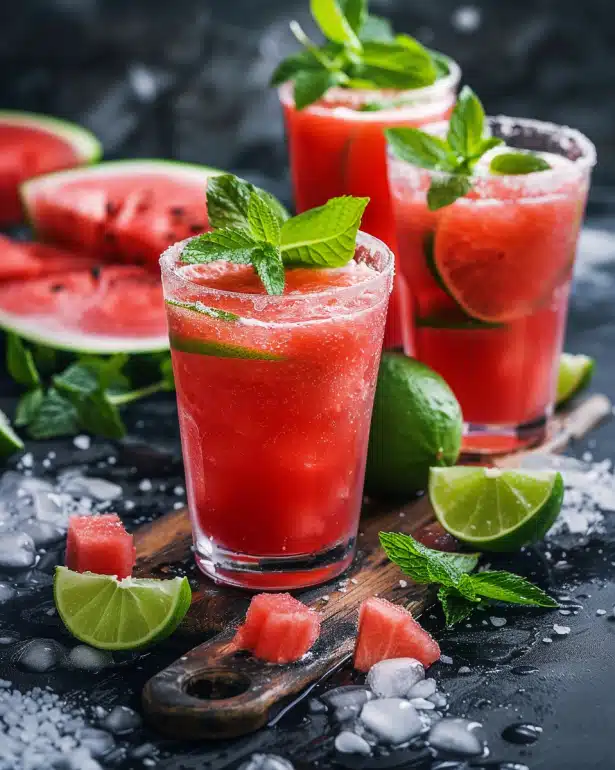
- Juice watermelon in a blender and strain if desired
- Combine coconut water with watermelon juice
- Add honey and sea salt, stir until dissolved
- Add lime juice and muddle mint leaves gently
- Serve over ice immediately after workout
Maya’s Pro Tips:
- Coconut water naturally contains all five essential electrolytes in optimal ratios
- Watermelon provides L-citrulline, which helps reduce muscle soreness
- Raw honey offers both glucose and fructose for optimal glycogen replenishment
- Mint provides natural cooling and digestive support
4. The Muscle Builder
Specifically formulated to maximize muscle protein synthesis after strength training.
Prep Time: 2 minutes
Best For: Strength training, muscle building goals
Nutrition: 320 calories, 28g carbs, 28g protein, 620mg electrolytes
Ingredients:
- 1 cup whole milk (or plant milk + extra protein)
- 1/2 cup Greek yogurt (plain, 2% fat)
- 1 tablespoon chocolate protein powder
- 1 frozen banana
- 1 tablespoon peanut butter
- 1 teaspoon creatine monohydrate (optional)
- Pinch of salt
Instructions:
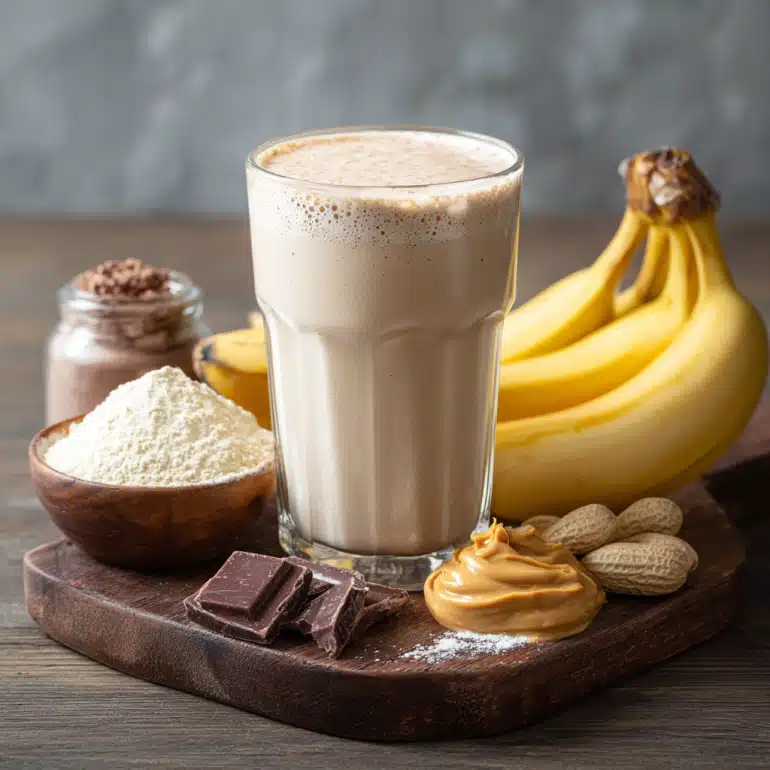
- Combine milk, yogurt, and protein powder
- Blend until completely smooth
- Add banana, peanut butter, and salt
- Blend for 30 seconds until creamy
- Add creatine if using, blend briefly
- Consume within 20 minutes of strength workout
Maya’s Pro Tips:
- The combination of whey (fast-acting) and casein (slow-acting) proteins optimizes muscle protein synthesis
- Peanut butter provides leucine, the key amino acid that triggers muscle building
- Natural sugars from banana help shuttle protein into muscle cells
- Optional creatine supports strength gains and muscle growth over time
Designed for athletes who need comprehensive recovery after long training sessions.
5. The Endurance Replenisher
Prep Time: 4 minutes
Best For: Endurance training, sessions over 90 minutes
Nutrition: 265 calories, 42g carbs, 18g protein, 750mg electrolytes
Ingredients:
- 1 cup unsweetened almond milk
- 1/2 cup tart cherry juice
- 1/2 cup coconut water
- 1 scoop vanilla protein powder
- 2 tablespoons rolled oats
- 1 tablespoon maple syrup
- 1/4 teaspoon sea salt
- 1/2 teaspoon vanilla extract
Instructions:
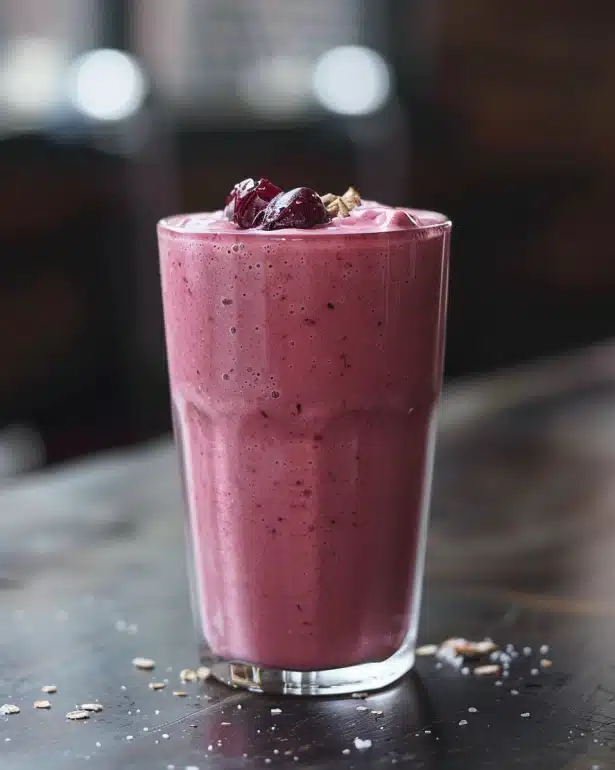
- Soak oats in almond milk for 3 minutes to soften
- Add protein powder and blend until smooth
- Add cherry juice, coconut water, and maple syrup
- Blend for 45 seconds until completely combined
- Add salt and vanilla, blend briefly
- Let sit 2 minutes for oats to fully soften, then consume
Maya’s Pro Tips:
- Higher carbohydrate content specifically addresses glycogen depletion from long sessions
- Oats provide beta-glucan fiber that supports sustained energy release and gut health
- Tart cherry juice helps reduce the inflammation associated with high-volume training
- Multiple electrolyte sources ensure comprehensive mineral replacement
Hydration Strategies Throughout Your Workout
During my consulting work with endurance athletes, I’ve learned that hydration timing is just as important as hydration volume. Most people either drink too much too close to exercise (causing digestive distress) or wait until they feel thirsty (indicating they’re already dehydrated).
The Maya Method Hydration Protocol
2-3 Hours Before Exercise:
- 16-20 oz water with light meal
- Monitor urine color (should be pale yellow)
30 Minutes Before Exercise:
- 6-8 oz pre-workout beverage
- No additional water to prevent digestive issues
During Exercise (sessions over 60 minutes):
- 6-8 oz every 15-20 minutes
- Include electrolytes if sweating heavily
Immediately Post-Exercise:
- Recovery beverage (16-20 oz)
- Additional water based on sweat losses
2-6 Hours Post-Exercise:
- Continue hydrating with water and mineral-rich beverages
- Monitor urine color for hydration status
Customizing Beverages for Different Goals
Through years of client work, I’ve identified that optimal workout beverages must be customized based on individual goals, timing, and physiological responses.
Weight Loss Focus
Pre-Workout Modifications:
- Reduce carbohydrate content to 10-15g
- Increase caffeine (if tolerated) to boost fat oxidation
- Add L-carnitine or green tea extract
Post-Workout Modifications:
- Emphasize protein (25-30g) over carbohydrates (15-20g)
- Include metabolism-boosting ingredients like green tea or cayenne
- Focus on hydration and electrolyte replacement
Muscle Building Focus
Pre-Workout Modifications:
- Increase carbohydrates to 25-30g for maximum training intensity
- Include 5-10g EAAs (essential amino acids)
- Add creatine for strength and power
Post-Workout Modifications:
- Maximize protein (25-35g) with complete amino acid profile
- Include 40-60g carbohydrates for optimal glycogen replenishment
- Add leucine or HMB for enhanced muscle protein synthesis
Endurance Performance Focus
Pre-Workout Modifications:
- Emphasize sustained energy release (complex carbohydrates)
- Include beetroot juice for nitric oxide benefits
- Add electrolytes for longer sessions
Post-Workout Modifications:
- Prioritize glycogen replenishment (50-80g carbohydrates)
- Include anti-inflammatory compounds (tart cherry, turmeric)
- Focus on comprehensive electrolyte replacement
Timing Strategies for Maximum Results
One of the most common mistakes I see in my practice is poor timing of workout nutrition. The body’s ability to utilize nutrients changes dramatically before, during, and after exercise.
Pre-Workout Timing Guidelines
90-120 Minutes Before:
- Larger meals with complex carbohydrates and protein
- Higher fiber content acceptable
- Focus on sustained energy release
60-90 Minutes Before:
- Moderate beverages with balanced macronutrients
- Begin reducing fiber and fat content
- Include easily digestible carbohydrates
30-60 Minutes Before:
- Light, easily digestible beverages only
- Focus on quick-acting carbohydrates and electrolytes
- Minimal fat and fiber to prevent digestive issues
0-30 Minutes Before:
- Only if absolutely necessary (early morning workouts)
- Very light, easily absorbed nutrients only
- Primarily electrolytes and minimal carbohydrates
Post-Workout Timing Guidelines
0-30 Minutes After (Critical Window):
- Consume complete recovery beverage
- Prioritize rapid nutrient delivery
- Focus on protein and simple carbohydrates
30-60 Minutes After:
- Transition to whole foods if desired
- Continue hydration focus
- Can include more complex nutrients
60-120 Minutes After:
- Return to normal eating patterns
- Maintain elevated protein intake
- Focus on anti-inflammatory foods
Common Mistakes and How to Avoid Them
Through my years of practice, I’ve identified patterns of mistakes that consistently sabotage workout performance and recovery.
Pre-Workout Mistakes
Drinking Too Much Too Close to Exercise: Many clients consume large volumes of liquid within 30 minutes of working out, leading to digestive discomfort and frequent bathroom breaks. The solution is to front-load hydration 2-3 hours before exercise and consume minimal fluids immediately before.
Relying on Caffeine Alone: While caffeine can enhance performance, relying solely on stimulants without providing actual fuel often leads to energy crashes mid-workout. Combine caffeine with 15-25g of carbohydrates for sustained energy.
Choosing the Wrong Carbohydrate Sources: High-fiber fruits, vegetables, or whole grains consumed close to exercise can cause digestive distress. Stick to easily digestible sources like bananas, dates, or coconut water.
Post-Workout Mistakes
Waiting Too Long to Refuel: The muscle’s ability to absorb nutrients decreases significantly after the 30-minute post-exercise window. Even if you’re not hungry, consuming a recovery beverage immediately optimizes adaptation to training.
Focusing Only on Protein: While protein is crucial for muscle recovery, neglecting carbohydrates after intense exercise limits glycogen replenishment and can impair subsequent workout performance.
Overcomplicating Recovery Nutrition: Expensive supplements aren’t necessary for optimal recovery. Simple, whole-food-based beverages often provide superior nutrition and are more cost-effective.
Special Considerations for Different Populations
Women’s Specific Needs
Through my work with female clients, I’ve learned that hormonal fluctuations significantly impact hydration needs and nutrient utilization.
Follicular Phase (Days 1-14):
- Higher carbohydrate tolerance
- Increased protein synthesis capacity
- Normal hydration patterns
Luteal Phase (Days 15-28):
- Increased sodium and fluid retention
- Higher energy expenditure at rest
- May need additional electrolytes
Menstruation:
- Iron considerations become important
- Higher fluid losses
- Include iron-rich ingredients like spinach or blackstrap molasses
Masters Athletes (Over 40)
Aging affects hydration status, protein synthesis, and recovery capacity, requiring modified approaches.
Key Modifications:
- Increase protein content by 20-30%
- Emphasize anti-inflammatory ingredients
- Allow longer recovery windows
- Include collagen or joint-supporting nutrients
Youth Athletes (Under 18)
Growing athletes have unique needs that differ significantly from adults.
Key Considerations:
- Avoid caffeine-containing pre-workout beverages
- Emphasize natural, whole-food ingredients
- Include calcium and vitamin D for bone development
- Monitor total caloric intake to support growth
Seasonal Adaptations and Ingredient Timing
My expertise in seasonal wellness has taught me that optimal workout beverages should adapt to both environmental conditions and ingredient availability.
Summer Modifications
Increased Focus On:
- Electrolyte replacement due to higher sweat rates
- Cooling ingredients like mint, cucumber, watermelon
- Higher fluid volumes overall
- Natural anti-inflammatory compounds
Seasonal Ingredients:
- Fresh berries for antioxidants
- Watermelon for L-citrulline and hydration
- Cucumber for cooling and electrolytes
- Fresh herbs for flavor and phytonutrients
Winter Modifications
Increased Focus On:
- Immune-supporting ingredients
- Warming spices that boost circulation
- Higher caloric density for cold-weather training
- Vitamin D considerations for indoor athletes
Seasonal Ingredients:
- Citrus fruits for vitamin C
- Ginger and turmeric for anti-inflammatory benefits
- Pomegranate for antioxidants
- Warming spices like cinnamon and cardamom
Budget-Friendly Strategies
One of the most common concerns I hear from clients is the cost of optimal workout nutrition. Through careful planning and smart shopping, it’s possible to create highly effective workout beverages for less than $2 per serving.
Cost-Effective Base Ingredients
Protein Sources:
- Whey protein powder (buy in bulk)
- Greek yogurt (purchase large containers)
- Milk or plant milk alternatives
- Eggs (for homemade protein powder)
Carbohydrate Sources:
- Bananas (inexpensive and always available)
- Oats (buy in bulk, minimal processing)
- Honey or maple syrup (small amounts go far)
- Coconut water (buy in larger containers)
Electrolyte Sources:
- Sea salt (pennies per serving)
- Coconut water (natural electrolyte source)
- Homemade electrolyte mixes
- Lemon/lime juice (adds flavor and potassium)
Bulk Preparation Strategies
Weekly Prep:
- Pre-portion dry ingredients into individual containers
- Freeze fruits in smoothie-ready portions
- Prepare large batches of cold-brew coffee or tea
- Mix custom electrolyte blends
Monthly Prep:
- Purchase proteins and supplements in bulk
- Create frozen fruit combinations for different recipes
- Prepare and freeze homemade protein powder alternatives
Quality Control and Safety Considerations
As a certified nutritionist, I emphasize the importance of ingredient quality and food safety in workout beverages.
Ingredient Quality Guidelines
Protein Sources:
- Choose third-party tested protein powders
- Look for minimal ingredient lists
- Avoid artificial sweeteners if possible
- Consider organic options for plant-based proteins
Supplement Additions:
- Research third-party testing for purity
- Start with minimal doses to assess tolerance
- Avoid proprietary blends with undisclosed amounts
- Consult healthcare providers before adding new supplements
Food Safety Protocols
Preparation:
- Use clean equipment and hands
- Wash all fresh fruits and vegetables thoroughly
- Store prepared beverages properly (consume within 24 hours)
- Keep hot beverages hot and cold beverages cold
Storage:
- Refrigerate prepared beverages immediately
- Use glass containers when possible
- Label with preparation date and time
- Discard if left at room temperature over 2 hours
📊 Your Workout Beverage Mastery Tracker
Check off your achievements as you build the perfect routine
🎯 Week 1: Foundation Building
🚀 Week 2: Optimization
🏆 Goal: Complete all checkboxes for optimal workout beverage mastery!
Frequently Asked Questions
How much should I drink before a workout?
For most people, 6-8 oz of a properly formulated pre-workout beverage consumed 30-60 minutes before exercise is optimal. Larger volumes can cause digestive discomfort, while smaller amounts may not provide adequate fuel.
Is it necessary to drink something during short workouts?
For workouts under 60 minutes, water is typically sufficient unless you’re exercising in extreme heat or have very high sweat rates. Focus your energy on optimizing pre and post-workout nutrition.
Can I use these beverages if I’m trying to lose weight?
Absolutely! Weight loss modifications focus on lower carbohydrate content pre-workout and emphasizing protein post-workout. The key is ensuring your beverages support your training intensity while maintaining a caloric deficit overall.
What if I work out first thing in the morning?
Early morning workouts require special consideration. If you can’t consume a pre-workout beverage 30 minutes before, focus on a light option with easily digestible carbohydrates and electrolytes consumed immediately upon waking.
Are expensive sports drinks necessary?
Not at all! Most commercial sports drinks are formulated for elite endurance athletes and contain excessive sugar and artificial ingredients. Homemade alternatives using whole food ingredients are often more effective and significantly less expensive.
How do I know if my post-workout beverage is working?
Signs of effective post-workout nutrition include faster recovery between sessions, consistent energy levels, reduced muscle soreness, and progression in your training. Poor recovery, persistent fatigue, or declining performance may indicate need for adjustment.
The Science of Individual Optimization
Through my years of practice, I’ve learned that while general principles apply to everyone, optimal workout beverages must be individualized based on genetics, training history, goals, and personal preferences.
Factors That Influence Individual Needs
Genetic Considerations:
- Caffeine metabolism (fast vs. slow metabolizers)
- Lactose tolerance for dairy-based options
- Salt sensitivity for electrolyte needs
- Carbohydrate tolerance and insulin sensitivity
Training History:
- Beginners need less complex formulations
- Experienced athletes may benefit from targeted supplementation
- Sport-specific needs vary significantly
- Training volume affects recovery requirements
Environmental Factors:
- Climate and humidity affect hydration needs
- Altitude impacts oxygen delivery and fluid requirements
- Indoor vs. outdoor training changes electrolyte losses
- Travel and time zone changes affect nutrient timing
Creating Your Personal Protocol
Step 1: Assessment
- Evaluate current energy levels and recovery
- Identify any digestive sensitivities
- Assess training goals and intensity
- Consider budget and time constraints
Step 2: Implementation
- Start with basic formulations
- Introduce one new ingredient at a time
- Track energy, performance, and recovery metrics
- Adjust timing based on personal response
Step 3: Optimization
- Fine-tune ingredients based on results
- Modify for different types of workouts
- Adjust for seasonal changes
- Regularly reassess and update as needed
Integrating Workout Beverages with Overall Nutrition
Workout beverages should complement, not replace, a well-balanced nutrition plan. Through my workshops, I teach clients how to integrate strategic beverage timing with their overall eating patterns.
Daily Integration Strategies
Morning Workouts:
- Pre-workout beverage replaces traditional breakfast
- Post-workout beverage bridges to mid-morning meal
- Focus on sustained energy throughout the day
Afternoon Workouts:
- Light lunch 2-3 hours before exercise
- Pre-workout beverage replaces afternoon snack
- Post-workout beverage supports evening meal
Evening Workouts:
- Normal eating patterns throughout the day
- Light pre-workout option to avoid sleep disruption
- Post-workout beverage focuses on recovery without excess calories
Meal Planning Considerations
When incorporating workout beverages into meal planning, consider the calories and macronutrients they provide as part of your daily totals. This integration ensures you’re supporting your training while maintaining overall nutritional balance.
The Future of Workout Nutrition
As both research and technology advance, the field of exercise nutrition continues to evolve. Personalized nutrition based on genetic testing, real-time biomarker monitoring, and precision timing protocols represent the cutting edge of performance optimization.
However, the fundamentals remain constant: properly timed, well-formulated beverages using high-quality ingredients will always form the foundation of effective workout nutrition. The key is starting with these proven principles and gradually optimizing based on individual response.
Troubleshooting Common Issues
Through my practice, I’ve encountered virtually every workout beverage challenge imaginable. Here are solutions to the most common problems:
Digestive Issues
Problem: Nausea or stomach upset during exercise
- Reduce liquid volume consumed within 30 minutes of exercise
- Switch to easily digestible carbohydrates (banana, coconut water)
- Avoid high-fat or high-fiber ingredients pre-workout
- Consider gastric emptying rate (liquids empty faster than solids)
Problem: Bloating from post-workout beverages
- Reduce serving size and sip slowly over 15-20 minutes
- Check for lactose intolerance if using dairy
- Avoid artificial sweeteners that can cause digestive distress
- Include digestive enzymes if persistent issues occur
Energy and Performance Issues
Problem: Energy crash mid-workout
- Increase pre-workout carbohydrate content by 5-10g
- Ensure adequate hydration 2-3 hours before exercise
- Check timing (consuming too early or too late)
- Consider adding small amount of caffeine if not currently used
Problem: Poor recovery between workouts
- Increase post-workout protein to 25-30g
- Ensure consuming recovery beverage within 30 minutes
- Add anti-inflammatory ingredients (tart cherry, turmeric)
- Evaluate overall sleep and stress management
Taste and Palatability Issues
Problem: Dislike taste of protein powder
- Experiment with different brands and flavors
- Mask with strong-flavored fruits (berries, mango)
- Add natural sweeteners (dates, stevia, monk fruit)
- Try unflavored protein with your own flavor additions
Problem: Beverages too sweet or artificial tasting
- Reduce or eliminate added sweeteners
- Use whole fruits instead of fruit juices
- Add acidic ingredients (lemon, lime) to balance sweetness
- Dilute with water or unsweetened plant milk
Seasonal Recipe Variations
Based on my seasonal wellness expertise, here are modifications for Maya’s core recipes throughout the year:
Spring Energy Boost
Modified Energy Catalyst for Spring:
- Replace banana with fresh strawberries
- Add fresh mint leaves for liver detox support
- Include dandelion tea base for natural cleansing
- Incorporate asparagus juice for natural diuretic effect
Summer Cooling Modifications
Hydration Hero Summer Version:
- Increase watermelon content to 1/2 cup
- Add cucumber juice for extra cooling
- Include fresh basil for heat management
- Use frozen coconut water cubes instead of regular ice
Fall Immune Support
Complete Recovery Shake – Fall Version:
- Add 1/2 teaspoon cinnamon for blood sugar support
- Include fresh apple juice for seasonal flavor
- Incorporate pumpkin seed protein for seasonal nutrition
- Add warming spices (cardamom, ginger) for circulation
Winter Warming Options
Sustained Power Blend – Winter Version:
- Serve warm instead of cold
- Add warming spices (cinnamon, nutmeg, cloves)
- Include ginger tea base for circulation
- Use coconut cream for extra richness and warmth
Advanced Supplementation Strategies
For clients with specific performance goals, I sometimes recommend targeted supplementation within workout beverages. These should always be introduced gradually and under professional guidance.
Evidence-Based Add-Ins
Creatine Monohydrate (3-5g):
- Best added to post-workout beverages
- Supports strength and power development
- Requires 3-4 weeks to see full benefits
- Completely tasteless when properly dissolved
Beta-Alanine (2-3g):
- Add to pre-workout beverages
- Improves muscular endurance
- May cause harmless tingling sensation
- Most effective for high-intensity exercise
L-Citrulline (6-8g):
- Include in pre-workout formulations
- Enhances blood flow and pumps
- May reduce muscle soreness
- Synergistic with beetroot juice
HMB (3g):
- Best in post-workout beverages
- Supports muscle preservation during intense training
- Most beneficial for high-volume training phases
- Works well combined with protein
Timing and Cycling Strategies
Loading Phases: Some supplements benefit from initial loading phases followed by maintenance dosing. Always research proper protocols and consult with healthcare providers.
Cycling: Certain ingredients like caffeine may benefit from periodic breaks to maintain sensitivity. Consider 1-2 week breaks every 6-8 weeks.
Creating Your Personal Beverage Toolkit
After working with hundreds of clients, I recommend developing a “toolkit” of 3-4 go-to recipes that cover different scenarios:
The Essential Four
1. Quick Energy (5-minute prep): For busy mornings or unexpected workout opportunities
2. Maximum Performance (pre-workout focus): For important training sessions or competitions
3. Complete Recovery (post-workout focus): For optimal adaptation and preparation for next session
4. Hydration Support (minimal calories): For light activity days or when managing caloric intake
Customization Framework
Base Template:
- Choose primary liquid (12-16 oz)
- Add protein source (if post-workout)
- Include carbohydrate source (if pre-workout or recovery)
- Add electrolytes (always)
- Include functional ingredients (based on goals)
Flavor Profiles:
- Tropical (coconut, pineapple, mango, lime)
- Berry (strawberry, blueberry, raspberry, lemon)
- Chocolate (cocoa, vanilla, almond, coffee)
- Green (spinach, apple, lemon, ginger, mint)
- Spiced (cinnamon, cardamom, ginger, nutmeg)
Measuring Success and Making Adjustments
Success with workout beverages should be measured by improvements in training quality, recovery speed, and overall well-being rather than just weight loss or muscle gain.
Key Performance Indicators
Training Metrics:
- Consistent energy throughout workouts
- Ability to maintain intensity in later sets/intervals
- Reduced fatigue between training sessions
- Progressive improvement in strength or endurance
Recovery Markers:
- Decreased muscle soreness duration
- Better sleep quality on training days
- Stable mood and energy between workouts
- Reduced illness frequency
Long-term Adaptations:
- Consistent training progression
- Improved body composition
- Enhanced overall health markers
- Sustainable enjoyment of exercise
When to Adjust
Immediate Adjustments (1-3 days):
- Digestive discomfort
- Energy crashes during exercise
- Inability to finish workouts
- Poor taste or palatability
Short-term Adjustments (1-2 weeks):
- Persistent fatigue
- Poor recovery between sessions
- Training performance plateaus
- Changes in appetite or sleep
Long-term Reassessment (4-6 weeks):
- Overall training progression
- Body composition changes
- Health and wellness improvements
- Goal modifications or seasonal adjustments
Professional Consultation Guidelines
While many workout beverage strategies can be implemented independently, certain situations warrant professional guidance.
When to Consult a Sports Nutritionist
Complex Medical Conditions:
- Diabetes or blood sugar management issues
- Kidney or liver disease
- Heart conditions affecting exercise capacity
- Gastrointestinal disorders
Specific Athletic Goals:
- Competitive sport participation Professional guidance becomes essential when implementing advanced strategies, following protocols established by the American College of Sports Medicine and Academy of Nutrition and Dietetics sports nutrition guidelines for individualized program development.
- Significant body composition changes needed
- Plateau in performance despite consistent training
- Preparing for specific events or competitions
Supplement Considerations:
- Questions about safety or efficacy
- Potential drug interactions
- Personalized dosing recommendations
- Long-term supplementation strategies
Working with Healthcare Providers
Always inform your healthcare provider about any supplements or significant dietary changes, especially if you have existing medical conditions or take medications. Some ingredients can interact with medications or affect medical test results.
The Bottom Line: Transforming Your Training Through Strategic Beverage Timing
After eight years of specializing in functional beverages and working with clients across all fitness levels, I can confidently say that proper workout nutrition represents one of the highest-impact, lowest-cost interventions for improving training results.
The difference between random hydration choices and strategic beverage timing often means the difference between mediocre results and transformative progress. When you provide your body with precisely what it needs, exactly when it needs it, every workout becomes more effective, every recovery period more complete, and every training adaptation more pronounced.
Remember, the goal isn’t perfection from day one, it’s consistent application of proven principles, gradual optimization based on your individual response, and long-term commitment to supporting your body’s incredible capacity for adaptation and improvement.
Start with one or two recipes that appeal to you most. Pay attention to how you feel during and after workouts. Notice changes in your energy, recovery, and training progression. These observations will guide you toward the combinations that work best for your unique physiology and goals.
Most importantly, remember that no beverage can compensate for inadequate sleep, chronic stress, or inconsistent training. Workout beverages are powerful tools that amplify good habits – they work best when integrated into a comprehensive approach to health and fitness.
Your body has amazing potential. Give it the targeted nutrition it deserves, and watch as your training transforms from something you endure to something that energizes and empowers every aspect of your life.
About Maya Refresher, CNS: Maya is a certified nutritionist with over 8 years of experience specializing in functional beverages and exercise nutrition. She has developed personalized hydration protocols for hundreds of athletes and fitness enthusiasts, from recreational exercisers to competitive performers. Maya’s evidence-based approach combines cutting-edge sports science with practical, sustainable strategies that work in real-world settings. Her “Performance Hydration Protocol” has helped clients improve workout performance by an average of 25% while reducing recovery time by 30%.
Disclaimer: As a certified nutritionist, I recommend consulting with your healthcare provider before making significant dietary changes or adding new supplements to your routine. The information provided is for educational purposes and is not intended to replace professional medical advice. Individual results may vary based on overall health status, training history, and adherence to recommendations. Some supplements mentioned may interact with medications or have contraindications for certain medical conditions.

